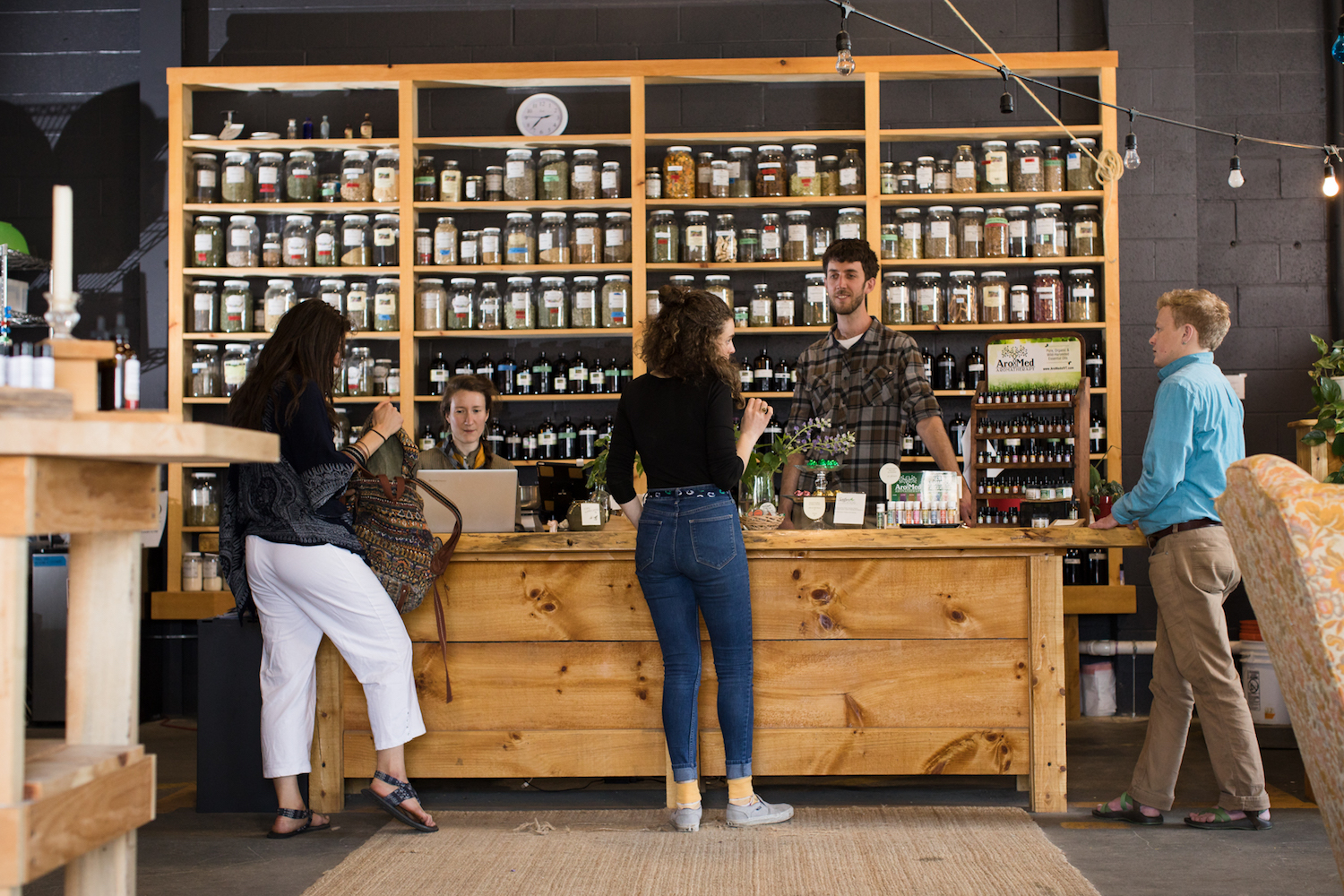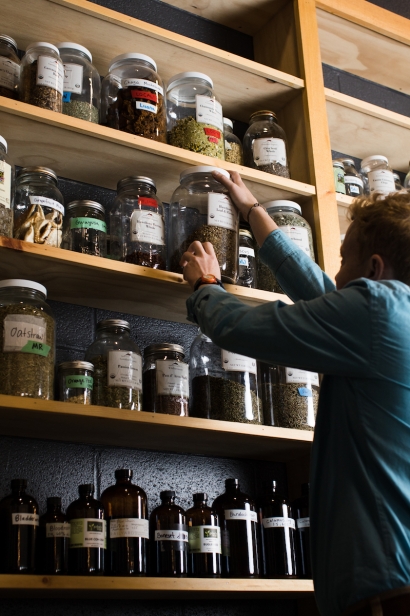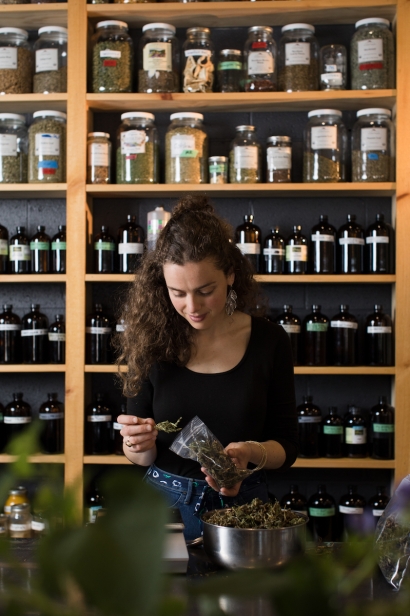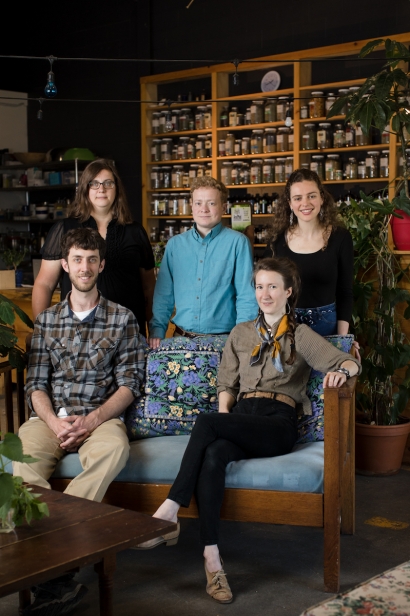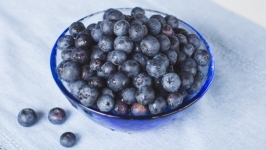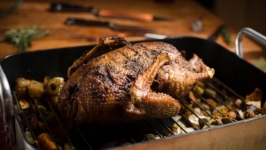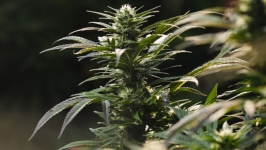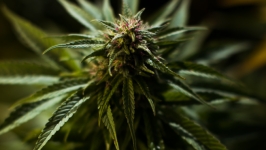Railyard Apothecary
Finding the Railyard Apothecary is not intuitive. It requires a little exploration of an area of Burlington that has remained relatively undeveloped, replete with a mix of rail cars splattered with graffiti and small stone bumpy terrain. But if one traverses the lot just off the beginning of Battery Street to its end, one discovers a small sign emblazoned with the apothecary’s logo. The door opens to cozy couches, soothing music and high ceilings that allow just the right amount of light to stream through. The counter at the front of the space beckons with sweet treats, a free tea offering, and of course, bottles upon bottles of herbs and tinctures—ready for dosing.
Railyard Apothecary is a nonprofit that is unique not only for its existence in a modern world but also for its proximity to the Burlington Herb Clinic right next door. Although the entities are separate businesses, the two have a synergistic relationship that works well for both the core staff of Railyard as well as the individuals who come to the apothecary seeking guidance. The four core staff members who oversee the apothecary are all graduates of the Vermont Center for Integrative Herbalism (VCIH) and serve as clinical herbalists at the clinic in addition to their responsibilities at the apothecary. Decisions at the apothecary are made by consensus and each individual has their own area of focus. Mica McDonald oversees stocking herbs, Susan Staley takes care of the retail component, Emma Merritt focuses on education coordination, and Nick Cavanaugh manages the finances. “We want to be a hub for the herbal community ... for practitioners and for those who are very familiar with or new to herbs,” McDonald explains.
Herb Sourcing
While all of the herbs at the apothecary are organic and/or sustainable, about 50% are currently local with an eye toward expanding that number in the coming year. McDonald’s sister, Kenzie McDonald, runs Wild Faith Herb Farm in South Burlington and provides the apothecary with many offerings. Other Vermont partners include Zack Woods Herb Farm, Foster Farm Botanicals, Hallow Herb Farm and Flack Family Farm. Spoonful Herbals also gleans locally and contributes to the apothecary’s stock.
Staley notes that while there has been an increase in the number of people working with herbal plants, that also raises the question of where they are coming from. Are they organic? What about fair wages and working conditions? There is also the issue of herb depletion and making sure the apothecary is keeping note of what herbs they may need to stop sourcing or find substitutions, such as goldenseal and slippery elm.
However, as the climate continues to change, McDonald sees more farmers diversifying their offerings to include herbs. In this way, both the farmer and the apothecary can help foster the health of the natural environment. As members of United Plant Savers, a nonprofit committed to promoting the preservation of native North American medicinal plants, the sustainability of herbal medicine is of key importance to the apothecary.
CBD
There’s no denying that CBD, in oil, capsule form or even in truffles has become ubiquitous in the Burlington market, and Railyard offers several value-added products to satisfy this niche. Currently, they carry AroMed products, including aromatic roll-ons, lotions and a Vermont hemp grown CO2 extract. CBD chocolate truffles from Satori Foods are also on offer.
“We really value CBD and cannabis but do not claim to be experts,” says Staley. “More importantly, however, is that we want people to know that the healing benefits of CBD will be increased when used in conjunction with other medicinal plants. Essentially, we resist the narrative that CBD is a ‘cure all,’ but we know it can be extremely helpful. We see the rise of CBD as important and appreciate the visibility cannabis is bringing to the value of medicinal plants. A ‘gateway’ herb into the interest in other herbs, if you will.”
Feeling intimidated by the world of herbs? The apothecary isn’t simply a spot to purchase herbs but is also an incredible resource for education via classes and events. Pop in for an herb walk along the waterfront, learn about reiki and reflexology with guest practitioners, or come by for a film, tea and herbal popcorn night where earth-based issues are at the forefront of conversation. A regular storytelling series, monthly kava nights and, in August, yoga classes on-site are all part of the apothecary’s commitment to fostering health and celebrating herbal traditions.
Ultimately, in McDonald’s view, the apothecary is playing an important role in “re-wilding the urban landscape,” healing the impacts of industrialization and serving as a concrete testament to the fact that “nature continues to thrive everywhere, even in the railyard.”
Railyard Apothecary | @railyard.apothecary
Burlington Herb Clinic
Vermont Center for Integrative Herbalism
Wild Faith Herb Farm | @wildfaithherbfarm
Zack Woods Herb Farm | @zackwoodsherbfarm
Foster Farm Botanicals | @fosterfarmbotanicals
Hallow Herb Farm
Flack Family Farm | @flackfamilyfarm
Spoonful Herbals | @spoonfulherbals
United Plant Savers | @unitedplantsavers
AroMed
Satori Foods | @satorifoodslove


